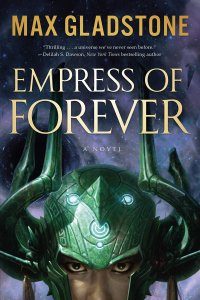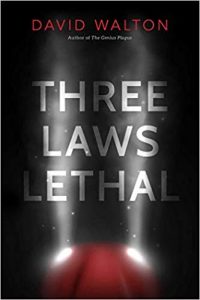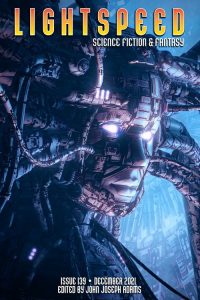Adrienne Martini Reviews Empress of Forever by Max Gladstone and Three Laws Lethal by David Walton
 Empress of Forever, Max Gladstone (Tor 978-0-7653-9581-8, 18.99, 480pp, hc) June 2019. Cover art by Tommy Arnold.
Empress of Forever, Max Gladstone (Tor 978-0-7653-9581-8, 18.99, 480pp, hc) June 2019. Cover art by Tommy Arnold.
Max Gladstone is best known for the Craft Sequence, a fantasy series about demons, angels, and insurance adjusters. With Empress of Forever, he’s crossing the imaginary divide between fantasy and science fiction to spin a space opera that is as lyrical and surreal as his earlier work.
The story starts on a place that looks very much like our Earth, if one that is a few years into the future. Viv Liao is a tech entrepreneur who is looking to disappear for a bit and create some havoc before she goes. Gladstone sums her character up succinctly during the opening scenes: “Viv wasn’t a mad scientist. She just wanted to crush her enemies and save the world.”
She puts her plan in motion – but rather than crush and save, she is confronted by the Empress, an alien superwoman who flings Viv through space and time. Rather than let this change of circumstance define her, Viv decides to crush this new universe’s enemies and get back home. A rag-tag band of fighters, clerics, and pilots assemble around her as they look to defeat the Empress and find “one non-shitty planet.”
Structure- and theme-wise, Empress of Forever feels a lot like The Wizard of Oz, if Oz had actually had all of the powers he claimed to and was inclined to genocide. Viv is our Dorothy, the misplaced hero who has to figure out what is going on in this weird new place while finding her way back to Kansas. The similarities to the Judy Garland classic are a feature rather than a bug. It’s nice to have something familiar to cling to when Gladstone turns the weirdness volume up beyond 11 to build a truly unique setting for his story.
 Three Laws Lethal, David Walton (Pyr 978-1-6338-8560-8, $29.95, 392pp, hc) June 2019.
Three Laws Lethal, David Walton (Pyr 978-1-6338-8560-8, $29.95, 392pp, hc) June 2019.
David Walton hit his stride with 2017’s The Genius Plague, which posited all kinds of cool ideas about fungi, humans, and behavior. That novel picked up the 2018 Campbell Award for Best Novel and was declared the best science fiction book of the year by the Wall Street Journal.
With Three Laws Lethal, Walton builds on that success by iterating on one of the classics of the genre: Isaac Asimov’s I, Robot. Here the robots are self-driving cars, whose programmed three laws lead to unforeseen consequences.
Walton doesn’t lead with that, however. He starts the story from several humans’ perspectives, like Tyler, the college programmer with a heart of gold, and Naomi, the socially awkward genius who revolutionizes AI. Tyler and his business partner Brandon are launching a new spin on the programs that could run a fleet of self-driving cars. Naomi and her sister Abby get tangled up in that project, which turns lethal at a moment when all of the world (or, at least, the part of the world likely to invest) is watching. Then their paths diverge.
What works well are all of the tech-y, think-y bits, which are Walton’s stock-in-trade. He knows how to build a world where all of his ideas can live. What doesn’t work as well are all of the people-y bits. While Tyler and Naomi are believable, most of the other characters are ciphers who merely serve the plot. After the accident, Brandon becomes an antagonist ripped from early melodrama who would twirl the heck out of his mustache if he had one.
It’s worth pushing through all of that for the ideas, as well as for some little nuggets of whimsy (like the kids’ show The Super Siphonophore Seven) Walton sprinkles along the way. Three Laws Lethal likely won’t be as fundamental to the genre as Asimov’s Robot books. Still, it’s an interesting take.
Adrienne Martini has been reading or writing about science fiction for decades and has had two non-fiction, non-genre books published by Simon and Schuster. She lives in Upstate New York with one husband, two kids, and one corgi. She also runs a lot.
This review and more like it in the August 2019 issue of Locus.
 While you are here, please take a moment to support Locus with a one-time or recurring donation. We rely on reader donations to keep the magazine and site going, and would like to keep the site paywall free, but WE NEED YOUR FINANCIAL SUPPORT to continue quality coverage of the science fiction and fantasy field.
While you are here, please take a moment to support Locus with a one-time or recurring donation. We rely on reader donations to keep the magazine and site going, and would like to keep the site paywall free, but WE NEED YOUR FINANCIAL SUPPORT to continue quality coverage of the science fiction and fantasy field.






